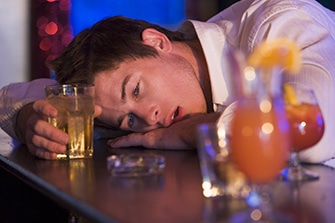The Most Dangerous Side Effect of Binge Drinking
While not everyone who binge drinks suffers from alcoholism, most people who suffer from alcoholism binge drink. This makes addiction the most dangerous side effect of binge drinking because it can cause devastating consequences; anything from a broken family to death can happen.
Binge drinking is the practice of consuming large quantities of alcohol in a single session, usually defined as five or more drinks at one time for a man, or four or more drinks at one time for a woman. If you or a loved one binge drinks and think it is harmless fun, it is time to rethink binge drinking as an extremely dangerous and possibly fatal habit.
Youth and The Fatal Effect of Binge Drinking
Though young people drink less often than adults, they consume more alcohol in the form of binge drinks than adults do. Youth already have a lower level of inhibitions and, when mixed with alcohol, can lead to deadly consequences.
- About 90% of the alcohol consumed by youth under the age of 21 in the United States is in the form of binge drinks.
- Alcohol is the most widely used substance of abuse among America’s youth
- 5.1 million young people reported binge drinking at least once in the past month
- 1.3 million young people reported binge drinking on 5 or more days over the past month
Young people who binge drink run a higher risk of forming an alcohol use disorder than adults. Binge drinking at a young age can lead to other dangerous side effects, such as:
- Issues with brain development
- Risky behavior, such as driving under the influence, performing dangerous stunts, and risky sexual behaviors
- Slowed development of hormones, organs, muscles, and bones
- Alcohol use disorder
Why Do People Binge Drink?
- Peer pressure. Peer pressure is a major cause of binge drinking, especially for young people. Individuals can feel pressure to participate in binge drinking at parties, clubs, celebrations, at college, and more. It is often seen as a rite of passage and can be difficult for young people to avoid.
- Genetics. If an individual grew up in a household environment in which the adults were frequently binge drinking, the likelihood that the children will repeat the same behavior skyrockets.
- Risk-Taking. Many people are thrill-seekers, especially youth. Some may want to “show off” how much they can drink in front of their friends. Some act impulsively, drinking in excess even though they shouldn’t.
- On accident. When an individual first begins drinking, it can take time to learn how much their body can handle and what responsible drinking habits are. As a result, some may accidentally drink to excess even though they did not intend to. In addition, some may drink cocktails that have more alcohol than they assumed, which can cause them to become more intoxicated than intended.
- Underlying mental health conditions. Many individuals drink because they are looking for an escape. This can be to relieve stress, to suppress difficult emotions, to forget a bad memory, to become more outgoing in a social situation, or to soothe anxiety. However, alcohol only exacerbates these conditions more.
- Alcohol use disorder. Many individuals who suffer from alcohol use disorder binge drink regularly. This is because they have a higher tolerance for alcohol and require more alcohol to be able to feel its euphoric effects. In addition, the dependency their body has on alcohol will cause them to not have control over how much and how often they drink.
When to Get Help
Addiction is the most dangerous side effect of binge drinking because it can lead to death. Addiction to alcohol can lead to death in many ways, such as automobile accidents, severe injury, suffering from delirium tremens, liver disease, suicide, and many more. It is very important to be aware of binge-drinking habits and only consume responsible amounts in order to avoid addiction and death. However, this can be impossible for people who are suffering from alcohol use disorder, making it important to know when to get help.
- Inability to control, slow, or stop drinking
- Frequent hangovers
- Blacking out regularly
- Drinking at inappropriate times of the day, such as in the morning
- Hiding drinking habits
- Isolation from friends and family
- Loved ones expressing concern
- Drinking in order to feel “normal”
- A decline in performance at work or school
- Weight loss or weight gain
- Sleeping problems
- Suffering legal or financial consequences due to drinking
- Drinking interferes with daily routine and responsibilities
About Cliffside Malibu
The best way to avoid the most dangerous side effect of binge drinking is to abstain from alcohol altogether. However, this can be difficult for individuals who are suffering from alcohol use disorder. “Just stop drinking” isn’t as easy as it sounds, and getting sober involves much more than abstinence. It requires support, therapy, and medical supervision.
Since no two addictions are the same, Cliffside Malibu offers an individualized treatment plan for every client. We are committed to providing evidence-based treatment through a continuum of care model including medically supervised detox, residential treatment, day treatment, and outpatient services. Our program also includes family therapy and holistic therapy, as well. Whether an individual is suffering from substance abuse and/or alcohol addiction, our programs are structured to create a supportive environment where healing can begin.
In addition to world-class treatment, Cliffside Malibu offers luxury accommodations, a serene environment, five-star dining, and plentiful amenities. We understand that addiction treatment is a rigorous process. Therefore, we provide for your comfort and relaxation at every turn, allowing you to rejuvenate, and meet the demands of treatment with your greatest energy and attention.
For more information on Cliffside Malibu, visit cliffsidemalibu.com
